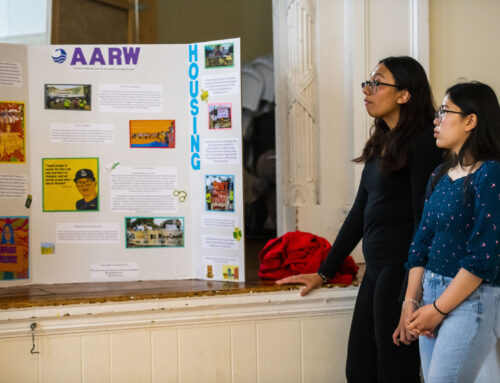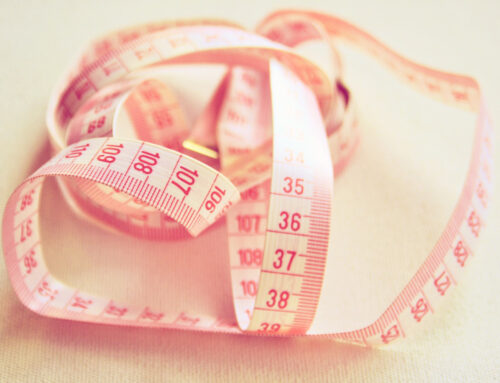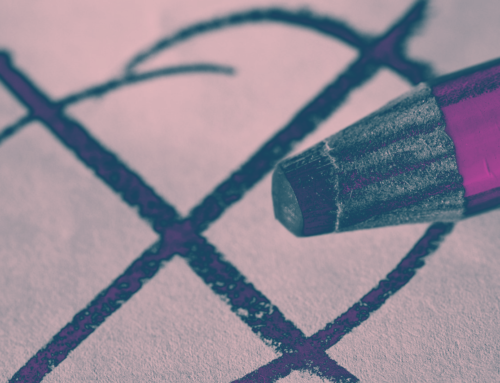
Right: Georgia Lale stands in front of an empty wall, where their piece was hanging.
On December 15, artist Georgia Lale’s new art made its debut in an exhibit at the Greek General Consulate in New York with two pieces, “Flag” and “Neighborhood Guilt.” Their artwork, made of bedsheets donated by Greek women, quickly became the subject of controversy, when “Flag” was forced to be taken down by order of the country’s Minister of Foreign Affairs on December 19, four days after the exhibit began, long before its end date of January 31. “Flag,” a large Greek flag that used bedsheets to create pink and white stripes instead of the traditional blue and white caused uproar as conservative and religious politicians argued that it made a mockery of the holiest of symbols.

“Clearly we will always protect the freedom of art, and that is something that needn’t be the subject of political debate. But there are some things that are sacred above all. One of them is our flag,” a government spokesman, Pavlos Marinakis, told Skai TV. Dimitris Natsios, the president of a religious political party in Greece, said that the only time the Greek flag’s colors may be altered is when it is “dyed red by the blood of heroes in a national struggle.” Others have characterized it as an insult to the Greek flag. After “Flag” was taken down, Lale also removed their second piece, “Neighborhood Guilt,” for fear it may be defaced.
Lale explained that the flag addresses the phenomena of femicide and domestic violence suffered by women in Greece, and how home is often not a safe place for victims of domestic violence. “The artwork is created out of bed sheets donated by women who live in Greece. Those women have seemingly few things in common but they have all laid down on those bed sheets desperate and scared,” they wrote on Instagram. “The majority of victims of femicide are murdered in their houses and on their beds. Their lives end on the bed that they make every morning. Their bed sheets soak up their blood. Similar bed sheets with those that soak up our tears, that soak up our dreams.”
The bed sheets were given “under the condition that [the women] have used them to rest their bodies and dream of a world where women will not be afraid to chase their dreams and stand up for their rights,” Lale told Hyperallergic. Their use of fabric to create art is intentional. According to an interview for the School of Visual Arts, they choose fabric that is worn, like hospital gowns or life vests, because it has “physical and psychological weight.” Lale’s art is deeply personal, as it draws on their Anatolian heritage and experiences as a cancer survivor. They have made pieces that deal with topics such as immigration and healthcare inequalities and incorporate various mediums, including physical movements and protest-like formations.

Right: Georgia Lale stands in front of the same table, but empty.
Many people immediately spoke out against the removal of the flag, including opposing political parties in Greece. PASOK, a center-left party, commented that censoring art brings back memories of “dark times,” while SYRIZA, a party further to the left, asked that art be left alone. Nasos Iliopoulos, a spokesperson for the New Left, accused the government of appeasing the far-right, and of wrongly censoring art instead of enforcing effective measures to deal with femicide and domestic violence. He went on to say that censorship does not align with the principles of democracy. The Greek Minister of Culture, Lina Mendoni, said, “As a personal principle I believe that art should not be censored . . . that is the position of the culture ministry.”
Social media users jumped to Lale’s defense, expressing their dismay at the decision by posting under the hashtags #georgialale and #ροζσημαια (pink flag). Not only was a piece of art removed—an act that directly undermines the very bedrock of democracy—but it was also attacked solely because its message made people uncomfortable. Lale shared artwork from a Greek elementary school, where students showed their support for “Flag,” and wrote messages, such as “no to violence” and “we fight for our sisters and our mothers,” on their rendition of the artwork.
In 2011, Greece signed the Istanbul Convention, formalizing its commitment to end violence against women. The European Institute for Gender Equality (EIGE) states that there are 39 counseling centers and 21 shelters for female victims of violence in Greece, and a helpline. There have also been various media campaigns to spread information about the forms domestic violence and abuse may take. But even at the counseling shelters, women continue to be at risk, with domestic violence being the most common form of gender-based violence reported at the centers. There is no shortage of evidence that domestic violence and femicide continue to be huge issues in Greece.
Exact figures on how many femicides occurred each year in Greece vary: the European Observatory on Femicide reported 31 cases in 2021, while the Mediterranean Institute for Investigative Reporting (MIIR) reported 23 in the same year and E.R.T. News reported 17. What is clear though, is that, during the pandemic, there was a sharp increase in domestic violence cases across Europe. In Greece, calls to helplines skyrocketed within the first two months of lockdown. These issues are still brushed under the rug in Greek society, which suffers from the symptoms of an intensely macho culture aggravated by overstretched, hard-to-access, or non-existent social welfare structures.
According to the EIGE, Greece ranks fourth to last in the EU on the Gender Equality Index. A 2014 survey revealed that one in four people in Greece knew a woman who experienced domestic violence, and 25% of women experienced violence themselves. In the last few years, domestic violence against women in Greece has sharply increased, leading to more activists and victims speaking out. As in many other countries, the lockdown and subsequent economic pressures brought by COVID-19 caused an increase in domestic violence. A 2021 article from the Guardian illustrates how a catastrophic combination of police indifference and a lack of resources and other help—such as counseling and shelters—has led to ever-increasing deadly attacks on women.
The conversation sparked by Lale’s art is one that can no longer be avoided: the continued failure to act decisively to protect women at risk of gender violence has led to a rising body count and unreported cases of violence and abuse. The first femicide of 2024 has already been reported in Greece, around a week into the new year. Officials say the woman had been missing since New Year’s Day, and her partner and his friend are the primary suspects. The censorship of Lale’s art at this time is both ironic, given how prevalent the issue remains, and intentional, in its desire to silence public awareness of the issue. Unfortunately, Greece is not the only country that faces high rates of femicide. According to a 2022 report from the UN from the UN, 48,800 women and girls were killed worldwide by someone they knew, whether a partner or family member—the highest recorded figure in the last twenty years.
The choice to remove the artwork reflects poorly on the far-right politicians who refuse to recognize and value its message. The exhibition’s art advisory committee said in a statement that the artist’s work was chosen “for its strong symbolism.” “Unfortunately, the work has been misinterpreted and instrumentalized for political purposes, which have nothing to do with the social issue for which it was created,” the committee members told Hyperallergenic. They hope to continue the artist exhibition series and remain “optimistic that the local artistic community will continue to support artistic freedom and creation.”
“I am glad that the independent Cultural Committee and the Greek Consulate gave my art a platform and they have been supportive through this ordeal. The responsibility falls on the Greek Minister of Foreign Affairs, Georgie Gerapetritis that [sic] censored my work to satisfy the demands of a far-right party,” Lale wrote, in an email sent to Keke. “I was targeted by far-right members of the Greek Parliament as mentally unstable and dangerous because I spoke about femicides, domestic violence, and the effects of patriarchy in our society through my art.”



